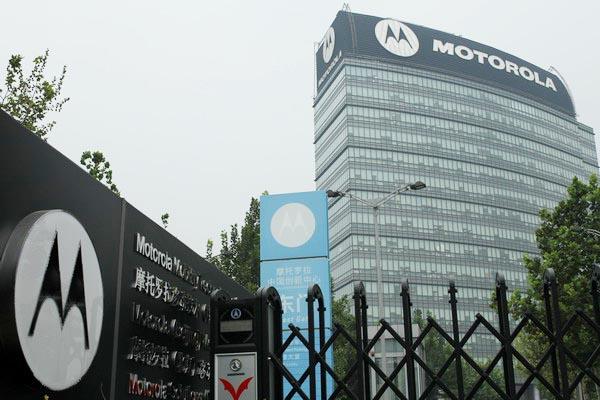Motorola accused of not communicating
 0 Comment(s)
0 Comment(s) Print
Print E-mail China Daily, August 20, 2012
E-mail China Daily, August 20, 2012
A motorcycle breaks down on a dusty country road. A mule has to pull it to its destination. The motorcyclist takes out a black object, the size of half a brick, and talks into it. Millions of Chinese TV viewers think it's cool. This is a flashback to the 1990s.
|
|
|
The Motorola building in Beijing. Hundreds of Motorola employees staged protests in Nanjing, Jiangsu province on Aug 16 and in Beijing on Aug 17, after being informed of a layoff. [Photo: China Daily] |
Motorola is making news again, this time of a different nature. Hundreds of employees laid off by the company staged protests in Nanjing, capital of Jiangsu province, on Thursday and in Beijing on Friday.
They said the attitude of the company's management, combined with the massive scale of the layoffs, had forced them to take to the streets.
"We are not after money. We feel humiliated by being forced to leave this way," said Chen Hongbin, 31, a cloud-computing engineer at Motorola's Beijing unit. He joined protesters waving banners in front of the Motorola building in Wangjing, northeast Beijing.
The protesters claimed Motorola is letting go about 700 of its 1,600 employees in Beijing, and closing its operations completely in Nanjing, where about 500 people were employed.
The company will slash about 4,000 jobs globally, one-third of them in the United States, according to an e-mail sent by Motorola's chief executive to the company's units across the world on Aug 13. This will reduce its workforce by 20 percent and result in the closure of a third of its 94 offices worldwide, said Motorola China's spokesman Kevin Si.
Motorola China's human resources department began talking with laid-off workers one by one on Aug 14. Since then, the conflict has been escalating, reaching a flashpoint that led to protests two days later. "They told us about the compensation, warning that there was no room for discussion, and asked us to sign the papers before 5 pm on Aug 15. They said if we didn't, our contracts would be terminated," Zheng said.







Go to Forum >>0 Comment(s)